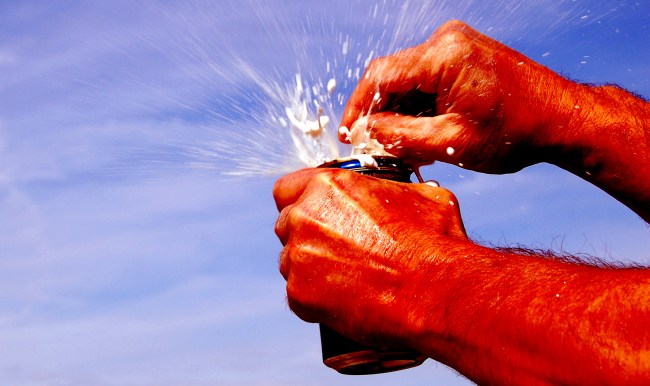
iStockphoto
Science is finally starting to address the issues that negatively affect the lives of people the world over on a daily basis: the catastrophic loss of precious beer from a can when it foams over as one opens it up.
As everyone who has ever opened up a few cans of beer knows, when you crack one open and foam pours out of the opening, you have immediately reduced the amount of delicious lager available for consumption. Thus, thousands, nay millions of people each and every year attempt to thwart this senseless tragedy by performing a time-honored tapping of the top of the can.
Whether this maneuver is actually effective is a question that most of us have never asked. It’s just simply what you do.
Scientists, however, are paid to ask, and answer, the hard questions such as this.
So that is exactly what researchers at the University of Southern Denmark in Odense did.
From their study…
Objective: Preventing or minimising beer loss when opening a can of beer is socially and economically desirable. One theoretically grounded approach is tapping the can prior to opening, although this has never been rigorously evaluated. We aimed to evaluate the effect of tapping a can of beer on beer loss.
Methods: Single centre parallel-group randomised controlled trial. 1031 cans of cans of beer of 330mL were randomised into one of four groups before the experiment: unshaken/untapped (n=256), unshaken/tapped (n=251), shaken/untapped (n=249), or shaken/tapped (n=244). The intervention was tapping the can of beer three times on its side with a single finger. We compared tapping versus non-tapping for cans that had been shaken for 2 minutes or were unshaken. Three teams weighed, tapped or did not tap, opened cans, absorbed any beer loss using paper towels, then re-weighed cans. The teams recorded the mass of each can before and after opening with an accuracy of +/-0.01 grams.
Main outcome measure: The main outcome measure was beer loss (in grams).
They really are doing the Lord’s work over there in Denmark.
“Being a scientist, I always wanted to know whether it actually has an effect,” researcher Elizaveta Sopina told New Scientist.
[protected-iframe id=”794e3924c4ac4eff1c7174ffe7ca185e-97886205-92827192″ info=”https://giphy.com/embed/yMNxjDum4c9Ik” width=”640″ height=”360″ frameborder=”0″ class=”giphy-embed” allowfullscreen=””]
Sadly, the results did not match our expectations.
“For shaken cans, there was no statistically significant difference in the mass of beer lost when tapping compared to not tapping. For unshaken cans, there was also no statistically significant difference between tapping and not tapping,” the study states.
Conclusion: These findings suggest that tapping shaken beer cans does not prevent beer loss when the container is opened. Thus, the practice of tapping a beer prior to opening is unsupported. The only apparent remedy to avoid liquid loss is to wait for bubbles to settle before opening the can.
Eh, who’s got time for that when there’s beer to be drank?